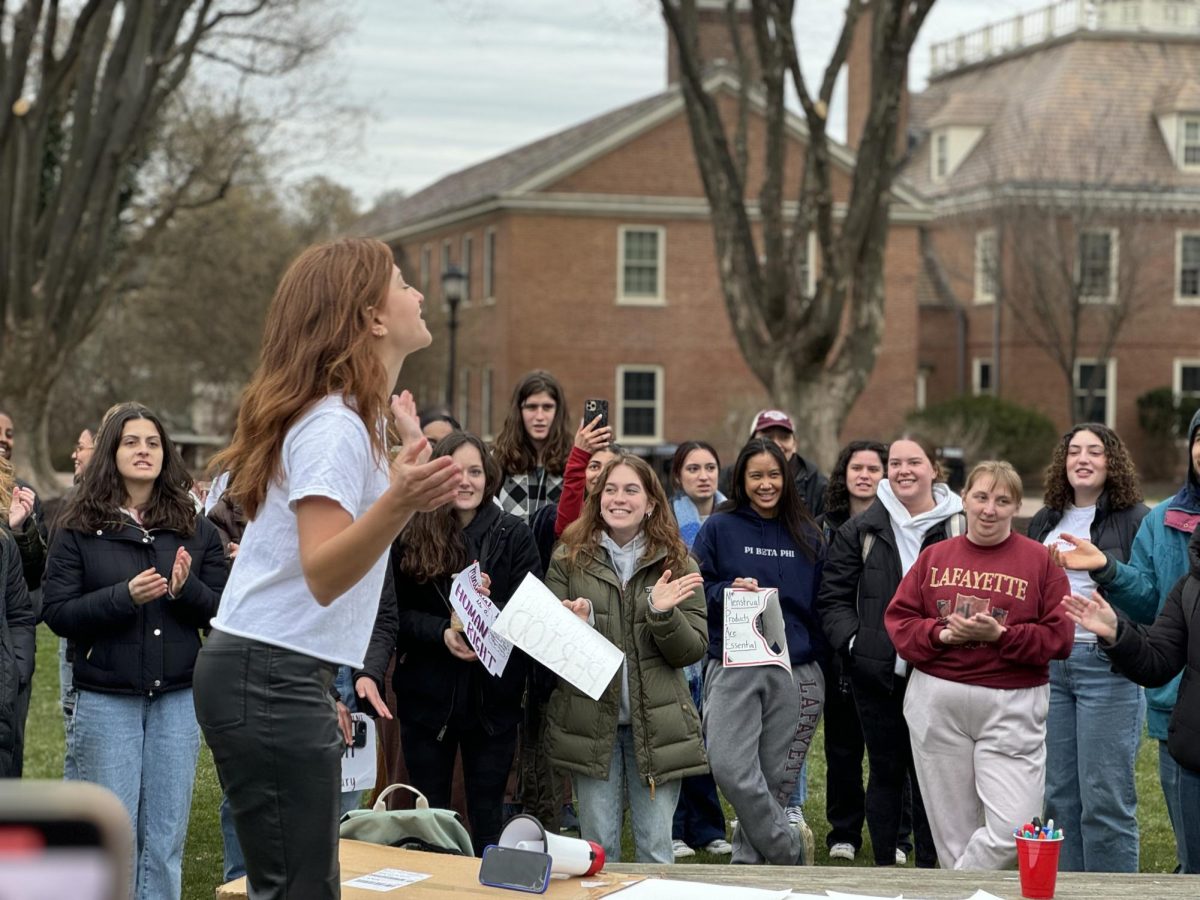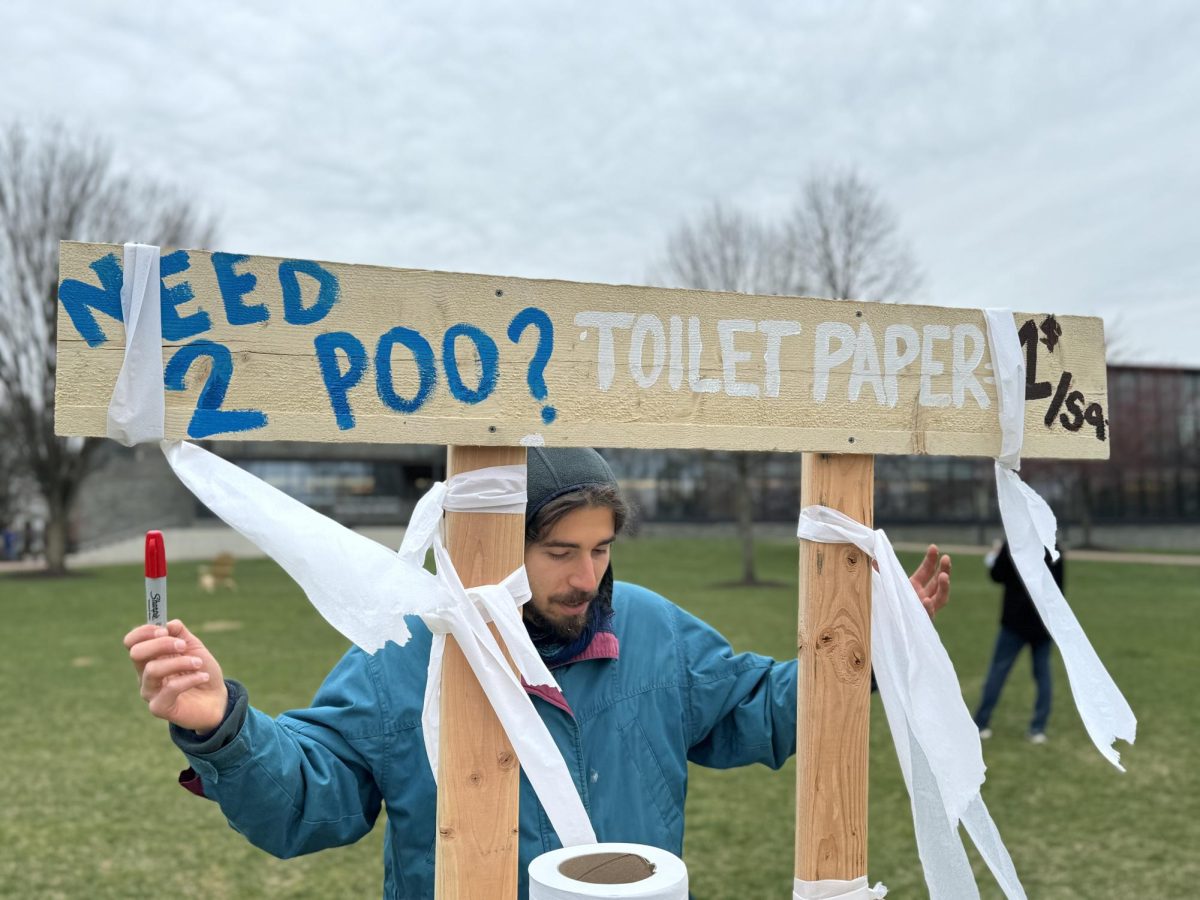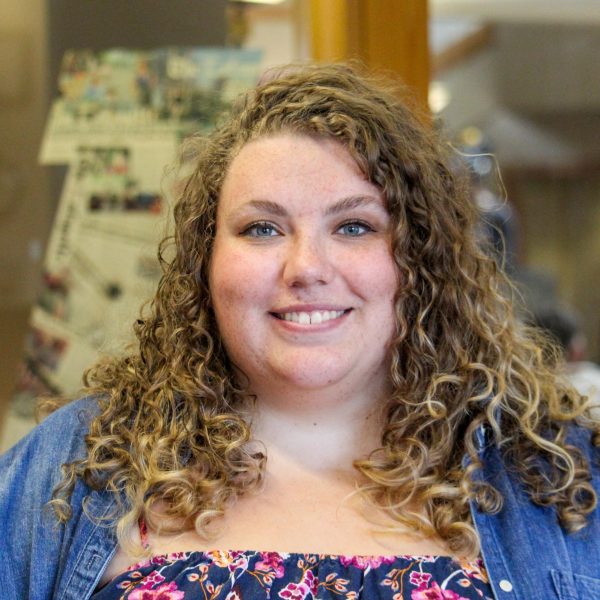A demonstration was held on Friday to protest the college administration’s insufficient funding of the Menstrual Equity Project, which provides free menstrual products in campus restrooms.
The protest was organized by Lafayette for Reproductive Autonomy, Justice and Empowerment, or L-RAJE, the sexual and menstrual health student group that oversees the Menstrual Equity Project. Roughly 80 students and a smattering of professors, administrators and parents attended the protest, which was held on the Quad in brisk temperatures.
Standing atop a picnic table and donning a short-sleeved “choice is power” t-shirt, Sophie Himmel ‘24, the L-RAJE president, demanded at least $6,000 from the college administration, the amount L-RAJE says is necessary to stock menstrual product dispensers each year. She claimed that dispensers have begun to run low on supplies.
“I’m starting to see students reaching out to me and other members of my organization saying ‘Where are the products? What’s going on?’” Himmel said through a megaphone. “I’d love to fucking know.”
According to L-RAJE representatives, the group was offered a $2,000 gift fund for the Menstrual Equity Project by Sarah Moschenross, the vice president for student life, and Nicole Eramo, the college president’s chief of staff. L-RAJE leadership claims that this fund is inadequate to sustain the Menstrual Equity Project.
Eramo, in an email to L-RAJE obtained by The Lafayette and sent days before the protest, called the criticism related to administrative funding for the Menstrual Equity Project “disingenuous” and claimed that she, Moschenross and Mark Sapara, the assistant vice president for student life, “expressed support for the project and asked for patience and continued dialogue” as they assessed options for “related resources.”
“They won’t pull the money from alumni events,” Himmel said of the college administration at the protest. “They won’t reorganize the budget. They won’t do anything.”
In an email, college spokesman Scott Morse defended the administration’s approach to the Menstrual Equity Project, citing the $11,000 it has already spent to fund it, that menstrual products are available free of charge through the Pard Pantry and that “most students manage their menstrual cycles so they have menstrual products available when they need them.” He added that administrators “are unsure why L-RAJE decided to pursue public blaming and shaming as a primary method to move this meaningful and important review forward.”
“L-RAJE has petitioned the administration to keep those dispensers constantly full for any student who uses menstrual products rather than for those facing emergency needs,” he wrote. “We disagree with them that convenience is the same as equity—that the College should be responsible for supplying the dispensers with all the menstrual products needed on campus. To meet emergency needs, though, the College has already committed $2,000 annually to stock the dispensers so that students who find themselves suddenly needing those supplies have convenient access to them.”
This $2,000 figure, according to Morse, “seemed like a sound first step” on the way to “better understanding of the emergency needs the dispensers are intended to meet.” He additionally questioned why L-RAJE, as a student organization, did not put its Student Government funding towards stocking menstrual product dispensers.
L-RAJE members circulated a petition at the protest that calls on the college to adopt a three-pronged approach: enshrining the Menstrual Equity Project in the campus master plan, providing a concrete timeline for funding the program and setting up an endowment fund supporting women’s equity.
By the end of the roughly half-hour protest, the petition, which circulated campus throughout the week, had amassed 300 signatures.
Additionally, members of the organization shared a QR code leading to a template for an email directed to Moschenross, Eramo, Sapara, college President Nicole Hurd and director of facilities operations Scott Kennedy.
“Menstrual hygiene is a human right,” reads the template. “To deny funding to this program is to deny that right.”
L-RAJE was formed in 2021 with the goal of addressing “period poverty” – a problem of accessing menstrual products faced by one in five female college students, according to a nationwide survey conducted by a feminine care company – by providing free menstrual products in over 30 campus restrooms.
Selma O’Malley ’26 contributed reporting.






























































































































